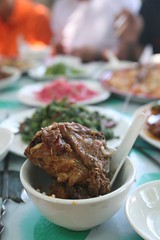Sunday, September 16, 2007
Chinese report: Internet users are unhealthy
Top signs you are a foreigner
You are wearing flip flops or shorts. Chinese men don't wear shorts, at least not outside in public. Wearing nice shoes or sneakers can also give you away.
You drink Diet Coke. While sugar-free drinks are increasing in popularity, they are still purchased mostly by foreigners.
You don't pull your shirt up to your chest to keep cool.
 Check out this guy sporting the latest summer trend.
Check out this guy sporting the latest summer trend.You react when people say, "Watch? Bag? Gucci, LV?"
You're chewing gum. Don't know why, but I rarely see any gum chewing, even though it's sold in every convenience store.
Saturday, September 15, 2007
Top signs you’re turning into a local
You spit on the street. You are super local if you inhale first or clear your throat like you are hocking a lugie.
You cover your mouth when you laugh. This really only applies to women. It is interesting to note that in
You wear short sleeve dress shirts. It’s hotter than heck outside. Why would you want to wear a long sleeve cotton shirt when there are short sleeve polyester blends?
You can use a squat toilet. Extra bonus points if you don’t need stall doors, or stalls at all for that matter.
You don’t own a credit card. If you’ve made the switch to a totally paper-based monetary system and lost the desire for consumer debt, you have lost your right to consider yourself a Westerner. Some banks in
You take the bus. Only a local would be willing to squeeze onto a tight bus, to drive really slowly to some unpopular part of town, just to save the $2 cab fare.
You randomly yell when you need service. This is most common at restaurants, since in other locations, the service people are in your face. If you are in need of assistance, the proper response is to wait until you catch your waiter’s attention and signal for it. It’s not to look at a waiter 20 feet away and yell, “Fuwuyuan!”
Wednesday, September 12, 2007
Back in the US of A
I was back in the Bay Area this past weekend for my sister’s wedding. I had a great time, and it wasn’t just because the wedding was a wonderful event. The weather was nice (~70 degrees fahrenheit the whole time). And even though a lot of guests complained about the overcast skies caused by recent forest fires, I thought the sky was incredibly, beautifully blue. Being back in the
My first stop from the airport was In-n-out for a double-double protein style. I hadn’t eaten lettuce so fresh in at least a year. Don’t know why lettuce in
My next stop was to a Citibank ATM. It’s like some sort of foreign exchange loophole that I can’t exchange RMB into US dollars, but thanks to an agreement between Citibank and Union Pay (the Chinese version of Visa), I can withdraw up to $600 a day from my RMB denominated Bank of China account at any Citibank ATM in the world. Therefore, almost every day that I was in the
The next day, I went to a local supermarket to buy breakfast for my family. I truly believe
I checked out a blog today that I regularly visit. It turns out that the writer was on my same flight to SFO last week and is returning today, two days after I did. There was a link to another expat forum asking the question: “What do you miss most in
I was a little sad to get on the plane to come back to
Sunday, September 2, 2007
Xinjiang food

I recently had dinner with some friends at a Xinjiang restaurant in Shanghai. The Xinjiang Uygur Autonomous Region is in northwest China and borders Kazakhstan and Pakistan. It is heavily Muslim, which is reflected in the cuisine - lots of lamb. While the roast lamb leg we ordered was excellent, the lack of any real vegetables on the menu (as well as the intense flavor of dish after dish of lamb) will probably keep me from going back for more. However, it was really impressive to see the wide cultural range of a country as homogeneous as China.
By the way, the picture above was not taken by me during our dinner. I've borrowed a picture from Flickr that looks like the meal we had.
Air China is not much better
Do not fly China Airlines - ever
On my trips to Taiwan, I almost always flew Cathay Pacific, which is based in Hong Kong and is a OneWorld Alliance member. When that was not available, I would fly Eva Air, a Taiwan carrier. I never flew China Airlines, the flagship carrier of Taiwan (the whole political naming issue often gets China Airlines confused with Air China).
Why? China Airlines has a terrible safety record. A long history of pilot error and poor maintenance makes it one of the more dangerous major air carriers. An explosion in Okinawa a few weeks ago is just another blemish on its record. Just after pulling in to the gate area, the plane exploded in a ball of fire.
Not wanting to further damage the reputation of the airline, China Airlines proceeded to paint over the logo on the plane as it awaited cleanup. I guess they didn't want ignorant passengers who hadn't heard of the story to see the plane in person?
